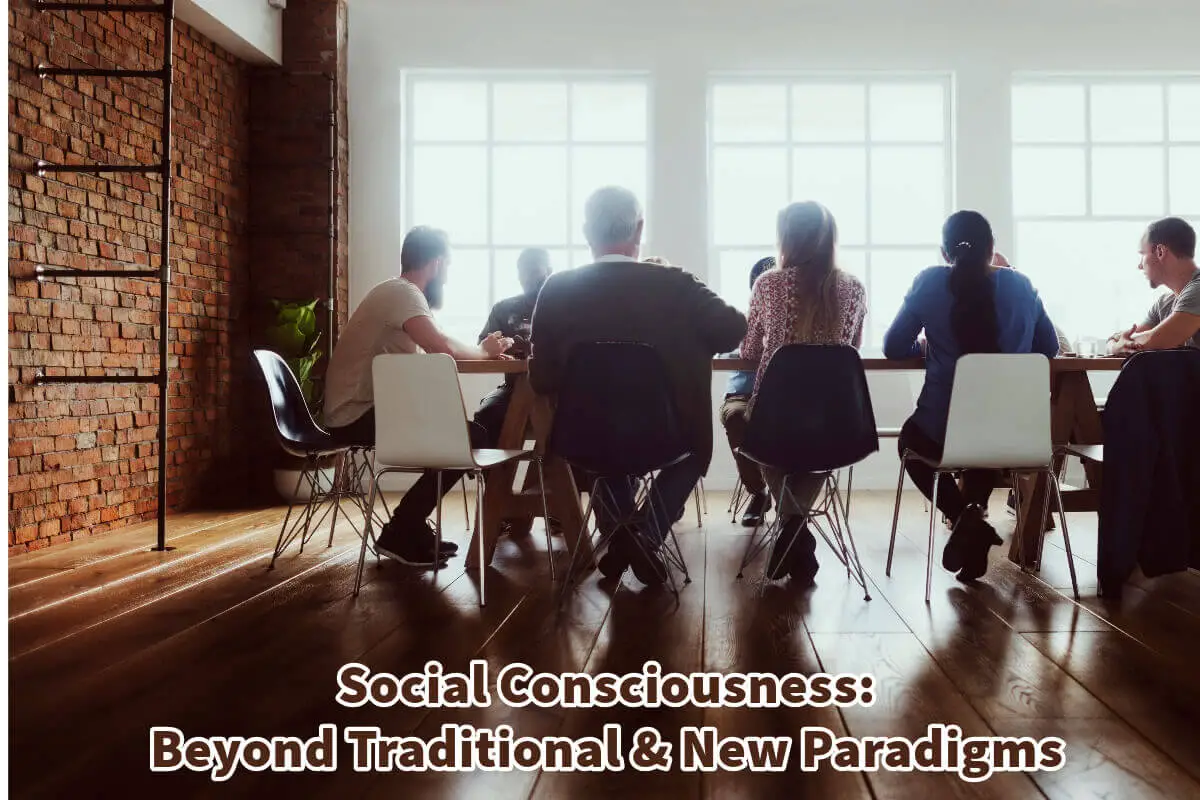The concept of social consciousness has fascinated scholars and thinkers from diverse fields, ranging from sociology and philosophy to economics. Social consciousness is an essential aspect for any company or organization to understand.
Social consciousness extends beyond mere individual existence, encapsulating our roles and responsibilities within a networked society, complete with ethical and moral nuances. However, the framework for understanding social consciousness is far from static; it’s an evolving tapestry of ideas, continually being reshaped by new viewpoints that challenge and expand their traditional boundaries and meanings.
Table of Contents
- Social Consciousness Explored: Beyond Traditional Frameworks And Towards New Paradigms
- Theorizing Social Consciousness: New Dimensions
- 12 Ways Companies Can Exhibit Social Consciousness
- 1. Fair Labor Practices
- 2. Transparent Supply Chain
- 3. Ethical Marketing
- 4. Community Engagement
- 5. Promoting Diversity And Inclusion
- 6. Ecological Footprint Reduction
- 7. Stakeholder Dialogue
- 8. Conscious Capitalism
- 9. Social Impact Programs
- 10. Transparency And Accountability
- 11. Employee Well-being Programs
- 12. Ethical Investments
- The Power Of Social Consciousness For Collective Transformation
- Frequently Asked Questions
- Related Content
Social Consciousness Explored: Beyond Traditional Frameworks And Towards New Paradigms
Social consciousness has long been a topic of interest across various disciplines, from sociology to philosophy to economics. Traditionally, it’s often been associated with ideas from thinkers like Karl Marx, who asserted that humans enter into specific productive or economic relationships that shape the collective consciousness.
It was the social thinker Karl Marx who said:
“It is not the consciousness of men that determines their being, but, on the contrary, their social being that determines their consciousness.”
Karl Marx
Social Consciousness Vs. Socialism: Clarifying Common Misconceptions
It’s easy to conflate social consciousness and socialism due to their apparent thematic overlaps, especially when both involve considerations of collective well-being, ethical responsibility, and societal structures.

However, they are distinct concepts operating in different thought and action spheres. Here’s how:
Definitions:
- Social Consciousness: This is an awareness of the problems different communities and groups face and an understanding one’s role and responsibilities within this interrelated network. It involves the application of ethics on a societal level, asking questions like “How can I contribute to societal well-being?” or “How can we collectively make society better?”
- Socialism: This is a political and economic system where the means of production, distribution, and exchange are owned or regulated by the community as a whole. Socialism seeks to reduce or eliminate the inequalities generated by capitalism, aiming for a more equitable distribution of wealth and resources.
Theoretical Frameworks:
- Social Consciousness: Rooted in philosophy, sociology, and sometimes even spirituality, the emphasis is on a cognitive and emotional understanding of society’s complexities and imbalances. It is inherently individual yet collective, internal yet external.
- Socialism: Primarily an economic and political construct, socialism is more concerned with policies and governance. It proposes structured solutions like socialized healthcare, education, and welfare programs to address societal inequalities.
Scope And Implementation:
- Social Consciousness: This can manifest in various ways, from grassroots activism and community volunteering to ethical consumer choices. It is not prescriptive but allows for various actions and attitudes contributing to social betterment.
- Socialism: This requires systemic change, often facilitated through governmental action. Implementing socialist policies means changes in laws and governance structures to redistribute resources more equitably.
Karl Marx And Social Consciousness:
It might surprise some that Karl Marx, often associated primarily with socialist and communist ideologies, has contributed to our understanding of social consciousness. Marx did indeed advocate for systemic change, but his philosophy was deeply rooted in a form of social consciousness that recognized the struggles and injustices faced by the underprivileged classes of his time.
Marx focused on the unjust economic systems that led to social inequality. His iconic statement that humans “enter into definite relations that are indispensable and independent of their will” highlights the systemic structures that limit individual agency, thereby contributing to collective social consciousness.
While Marx was invested in significant systemic changes to alleviate the conditions of the less fortunate, his writings also indicate an awareness of social issues that transcend purely economic solutions.
While both social consciousness and socialism aim for a better, more equitable society, they operate on different planes and are implemented through different means.
Social consciousness is a moral and ethical compass guiding individuals and communities in everyday choices and activism, whereas socialism offers structured, often governmental, solutions for reducing inequality.
Understanding these nuances can provide a more in-depth view of how we can approach social betterment.
It’s an awareness of one’s role within an interrelated community, often tinged with moral and ethical dimensions. But the landscape of social consciousness is continuously evolving, with fresh perspectives emerging that redefine its boundaries and implications.
Theorizing Social Consciousness: New Dimensions
Today, the concept of social consciousness continues to evolve, serving as both a theoretical framework and a practical guide for individuals and organizations. Join us as we delve into the various facets of this ever-changing idea.
Social Consciousness 2.0: Emotional Intelligence As Core
While rational or philosophical arguments often describe consciousness, it’s crucial to consider that social consciousness is inherently emotional. Pleasure, pride, guilt, and shame are not just individual feelings but collective sentiments that inform social norms.
The Ethical Matrix: A New Framework
This model presents social consciousness as a grid or matrix that interconnects ethical considerations with societal roles. It allows for a multi-dimensional understanding of how individual and collective ethics interact and influence each other.
Sustainable Literacy: The Keystone For Transformation
As we evolve, it’s becoming increasingly evident that social consciousness must encompass environmental and sustainable aspects. Sustainable literacy provides the necessary knowledge and tools to drive this transformation.
12 Ways Companies Can Exhibit Social Consciousness
Corporations and businesses have a significant role to play in shaping social consciousness. Here are twelve tangible ways they can demonstrate their commitment:

1. Fair Labor Practices
Prioritize the welfare of employees, offering fair wages, reasonable working conditions, and growth opportunities.
2. Transparent Supply Chain
Ensure your supply chain is transparent and adheres to ethical and sustainable practices.
3. Ethical Marketing
Steer clear of misleading advertisements and false claims. Provide genuine information to help consumers make informed decisions.
4. Community Engagement
Participate actively in community programs and contribute to local development financially or through volunteer initiatives.
5. Promoting Diversity And Inclusion
Make a concerted effort to celebrate diversity and foster an inclusive workplace environment.

6. Ecological Footprint Reduction
Implement policies to reduce waste, energy usage, and emissions, demonstrating a commitment to environmental responsibility.
7. Stakeholder Dialogue
Keep open communication channels with all stakeholders, including shareholders, employees, and customers, to engage them in the company’s social responsibility journey.
8. Conscious Capitalism
Adopt principles of conscious capitalism, which go beyond profit-making to include ethical considerations and stakeholder well-being.
9. Social Impact Programs
Initiate or partner with programs to positively impact social issues such as education, healthcare, or poverty.
10. Transparency And Accountability
Be open about the company’s performance metrics, including social responsibility and environmental impact.
11. Employee Well-being Programs
Invest in programs focusing on employees’ mental, emotional, and physical well-being.
12. Ethical Investments
Where the company invests its capital should reflect its social and environmental values, avoiding sectors detrimental to society or the environment.
The Power Of Social Consciousness For Collective Transformation
Social consciousness serves as a bridge between our existing world and the one we aspire to create. Understanding the nuances of our social conscience and those of the collective can guide us toward conscious choices that align with our values and ethics.
Moreover, a shared sense of social consciousness can help diverse groups find common ground, making it an invaluable tool for social and environmental transformation.
In this era of rapid societal changes, we must continuously refine our understanding of social consciousness and its implications.
This involves challenging old paradigms and embracing new theories that reflect our evolving collective identity. Only then can we hope to develop a social consciousness that serves as an effective tool for genuine societal transformation.
If you want to see how Mondoro can help you manufacture home decor products with a social conscience – we would love to talk to you about how we can help you and be part of your business.
If you are interested in seeing how Mondoro can help you with your social conscience – we would love to talk to you about how we can help you and be part of your business.
Find out more about how Mondoro can help you create, develop, and manufacture excellent home decor and home furniture products – don’t hesitate to contact me, Anita. Check out my email by clicking here or become a part of our community and join our newsletter by clicking here.
Mondoro gives out a FREE Lookbook to anyone interested. You can receive a copy of our latest Lookbook by clicking here.
Listen to our Podcast called Global Trade Gal. You can find it on all major podcast platforms. Try out to listen to one of our podcasts by clicking here.
Subscribe to our Mondoro Company Limited YouTube Channel with great videos and information by clicking here.
Frequently Asked Questions
What is social consciousness, and how does it differ from individual consciousness?
Social consciousness refers to the awareness and understanding of one’s role and responsibilities within a broader societal context. While individual consciousness focuses on personal awareness, social consciousness extends to the collective impact of individual actions on society.
How has the concept of social consciousness evolved over time?
Social consciousness has evolved from traditional perspectives that often emphasized community values to newer paradigms considering global interconnectivity. This evolution reflects changing societal structures, technological advancements, and the influence of diverse cultural and ethical viewpoints.
What role does ethics play in shaping social consciousness?
Ethics plays a crucial role in social consciousness by providing a moral compass for individuals and societies. It guides decisions that impact not only individuals but also the collective well-being, fostering a sense of responsibility towards social harmony and justice.
How can businesses contribute to social consciousness beyond profit-making?
Beyond profit-making, businesses can contribute to social consciousness by adopting sustainable practices, promoting diversity and inclusion, and actively participating in community initiatives. This approach recognizes the broader impact of business activities on society.
In what ways do emerging technologies influence social consciousness?
Emerging technologies shape social consciousness by facilitating global communication, exposing societal issues, and providing platforms for activism. However, they also raise ethical dilemmas, such as data privacy concerns and the digital divide, which require thoughtful consideration.
Are there cultural differences in how societies perceive and prioritize social consciousness?
Yes, cultural differences influence perceptions of social consciousness. Different societies may prioritize various values and issues based on their cultural, historical, and geopolitical contexts. Understanding these differences is crucial for fostering global collaboration.
How does the concept of social consciousness align with environmental sustainability?
Social consciousness and environmental sustainability are interconnected. Individuals and societies recognizing the impact of their actions on the environment contribute to a more sustainable and ecologically responsible approach, reflecting a broader sense of social responsibility.
Can education play a role in cultivating social consciousness?
Education plays a significant role in cultivating social consciousness by promoting critical thinking, empathy, and a global perspective. It equips individuals with the knowledge and skills to understand complex societal issues and actively participate in creating positive change.
How can individuals balance personal goals with a sense of social responsibility?
Balancing personal goals with social responsibility involves considering the broader impact of individual choices. This includes making ethical decisions, supporting community initiatives, and striving for personal success in ways that contribute positively to society.
What challenges exist in promoting a more inclusive and dynamic social consciousness?
Challenges in promoting a more inclusive social consciousness include overcoming cultural biases, addressing systemic inequalities, and navigating resistance to change. Creating a dynamic social consciousness requires ongoing dialogue, awareness, and a commitment to embracing diverse perspectives.
Related Content
Don’t Confuse Activity With Productivity & Other Myths
Being busy or having a lot of activities and things to do is not the same thing as productivity. Productivity is when you do those activities and things that help you focus on the company’s growth. Busyness or being busy is not the same thing as being productive.
You can discover more by reading Don’t Confuse Activity With Productivity & Other Myths by clicking here.
What Is Quietly Quitting? 8 Reasons Why It Is a Bad Idea
Quietly quitting is when workers decide to do no more than what is required. They decide that they will do the bare minimum. Quietly quitting started in China and was known as “lying down.” We do not believe “quietly quitting” is a good idea since it hurts the employee or the employer – both get hurt by this behavior.
You can discover more by reading What Is Quietly Quitting? 8 Reasons Why It Is a Bad Idea by clicking here.
8 Reasons Productivity Makes You Happy
There are many ways that productivity can help to make you happy. Studies have shown that some of the most productive people are also the most content. Productive people accomplish things, learn new things, achieve goals, and do the other things in life that help ensure they are effective and happy. The good news is that productivity can help to make you happy.
By clicking here, you can discover more by reading 8 Reasons Productivity Makes You Happy.


